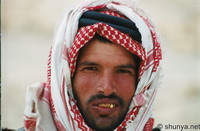Government mistreats Egypt's Bedouin
The mistreatment of the government made thousands of Egypt's Bedouin on Friday burn tires and block roads across the peninsula.

Some 5,000 Bedouins gathered in the village of el-Massoura near the Israeli border demanding basic services and the release of the members of their community detained in security sweeps following terrorist attacks against tourism sites over the last few years.
"They keep stalling in releasing our sons," tribal leader Sheik Moussa el-Delh told the Associated Press by phone. "We lack basic services, we don't even have running water, we are not asking for too much, we just want to be treated like humans."
There were reports of hundreds protesting and blocking roads in villages across the central Sinai and even near the southern resort city of Sharm el-Sheik, but the vast majority of the Bedouin were in el-Massoura village, the site of clashes with security forces in July that left one protester dead.
"We are not intending to escalate into violence, though if there were any intervention by security forces, there would be retribution," said el-Delh.
A security official in Cairo confirmed that protests were taking across the Sinai and said that police were under strict orders not to intervene, and local authorities would negotiate with the Bedouin.
The official, who asked not to be identified because he is not authorized to speak to the press, warned that "any violence will be responded to."
Demonstrators were also calling for the name of the village to be changed to "Auda the Martyr" in honor of 15-year-old Auda Mohammed Arafat, who died in the July clashes with police.
The impoverished Bedouin of northern Sinai have received little benefit from the tourist boom taking place in the south of the peninsula and instead make their living smuggling goods and people across the Israeli border and growing cannabis in isolated desert valleys - activities that put them in constant conflict with authorities.
The crisis in relations came to a head following several attacks on tourist sites starting in October 2004 that killed 125 people, mostly foreigners, and were blamed on disaffected Bedouins with militant connections. In the ensuing sweeps thousands were jailed.
July's clashes erupted following rumors that all Bedouin dwellings near the Israeli border would be bulldozed to stop smuggling. Among the protesters current demands is the rescinding of the demolition order.
"The Bedouin are not a plague," said el-Delh. "We are the owners of the land, we were here before any other cities were built."
Subscribe to Pravda.Ru Telegram channel, Facebook, RSS!


